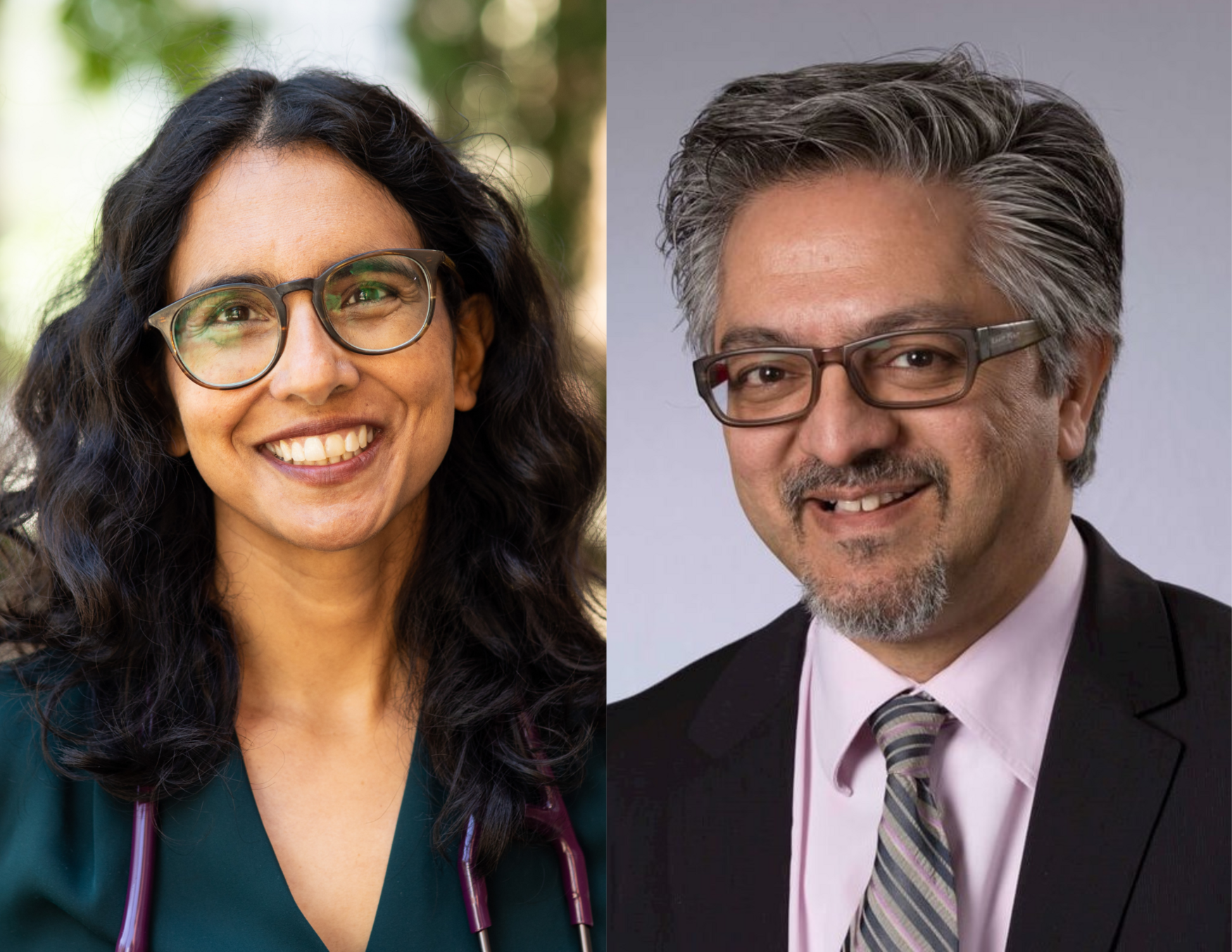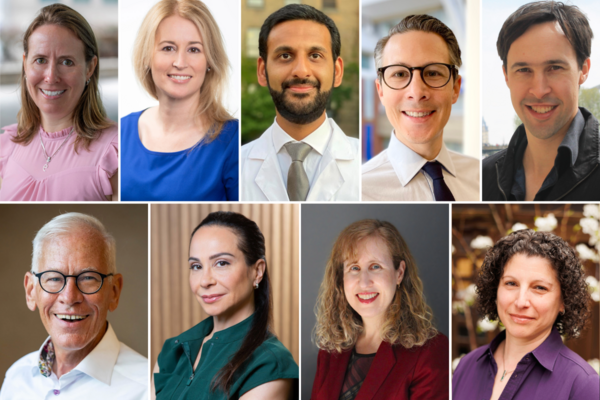A Culture of Curiosity: DFCM research leads receive prestigious awards
Dr. Tara Kiran and Dr. Peter Selby have each been recognized for their achievements in family medicine research

Faculty within the Department of Family and Community Medicine (DFCM) are among the most prolific family medicine researchers in the world. With the establishment of the department’s Research Program in 1995 and Quality and Innovation Program in 2011, there has been a surge in important work that impacts the discipline of family medicine, patient care, and clinician empowerment.
DFCM’s talented and dedicated researchers are guided by Dr. Peter Selby, Vice-Chair of Research, and Dr. Tara Kiran, Vice-Chair of Quality and Innovation—both of whom have won prestigious awards for their work. Dr. Selby has received the 2023 Canadian Society of Addiction Medicine Lifetime Achievement Award, and Dr. Kiran has received the North American Primary Care Research Group (NAPCRG) Mid-Career Researcher Award.
Both recently reflected on how they found primary care research, the importance of research impact, and offered words of advice for those interested in a similar career path.
Dr. Tara Kiran: Improving the health care system
Dr. Kiran’s career as a family doctor stemmed from a love of getting to know people and supporting them through their happiest and toughest moments. Research, however, was not originally in the cards. While completing her MSc in Public Health in the UK, she decided to explore health systems research as a way to impact health outside of a clinical setting. It was her final project on the pay-per-performance scheme—new for UK family doctors at the time—that kickstarted her career as a researcher.
“It got me thinking about the reforms that had happened in Ontario that affected payment for family doctors,” she says. “I ended up connecting with Dr. Rick Glazier, who agreed to mentor me, and I started doing some research in that area on the side of my clinical work. I really enjoy asking and answering questions, and I have a desire to make the health care system better. Through research, I’ve found an avenue where I can put my own skills to use to try and do that.”
One of her current projects and career highlights is OurCare, an initiative to engage patients across Canada about the future of primary care by asking for their perspectives on health system priorities.
“Patients and the public bring a really important perspective that unfortunately is not always included in research,” she says. “Every time I do patient engagement work, something new is revealed to me. I see issues in new and different ways, and it helps me see what the next steps forward should be.”
OurCare started with a national survey on patient experiences, values, and priorities about the health system, which received more than 9,000 responses. Next, Priorities Panels were held in five provinces with 30–35 randomly selected members of the public discussing the current state of primary care and putting forth recommendations for the future. An additional 10 Community Roundtables currently underway are focused on marginalized communities who have historically had difficulty accessing primary care.
What’s been amazing, she says, is how much people living in Canada agree on, especially at a time when our differences seem to be so prominent. For example, most agree that every person deserves access to high-quality primary care, should have access to their own medical records, and receive care from health teams that are community governed.
“I’m very hopeful that this work and the voices of these patients influence policymakers,” Dr. Kiran says. “Whether that be clinician leaders, professional organizations, or people in government.”
There is a primary care crisis in Canada, and the need for research to understand how we can get to a point where every person has access to care has never been greater. To do that, Dr. Kiran explains, the field needs smart and thoughtful people who can dedicate time to understanding the issues and challenges at hand and put forward policy solutions. A career in research means a career in lifelong learning, and anyone interested in going into research needs to be prepared to embrace that, take risks, and be committed to influencing policies.
“One piece of advice I would give to people who are interested in research would be to reach out to people who you’d like to have as mentors,” she says. “When I reached out to Dr. Glazier, I didn’t know him at all, but his work seemed like the kind of work I was interested in doing. He made time for me and that led to a 15-year collaboration. Take a risk and reach out to someone you’d like to have mentor you. Chances are they would be happy to support your career.”
Dr. Peter Selby: Helping people help themselves
Dr. Selby’s initial aspiration was to be a psychiatrist, but he found family medicine after immigrating to Canada in 1990. During his residency at Mount Sinai Hospital, he was inspired by the breadth of family medicine and developed a curiosity for research. But it only became a major component of his career thanks to his mentors.
“The biggest challenge for me was my imposter syndrome—I always felt I wasn’t worthy to occupy spaces of leadership in family medicine, academic institutions, or hospitals,” he says. “The lesson I carry from this is that we are on the wrong side of our eyeballs to see our potential. Mentors and coaches are critical to help us expand our horizons and make it safe to explore academia.”
Dr. Selby started his research on finding ways to reduce suffering in patients with chronic pain and addiction—specifically women who use substances while pregnant. Integrating that within his family practice while also caring for the woman and her infant was most rewarding. He then focused on prevention, mostly on the treatment of tobacco addiction. The biggest highlight of his career was establishing STOP, a free online smoking cessation program for patients struggling with tobacco use, and TEACH, a continuing education certificate program in intensive tobacco cessation counselling for practitioners, which together make a learning health system for tobacco addiction treatment.
“These programs allowed me to integrate my passion for research, education, policy, and system change by aligning the needs of patients, clinicians, managers, funders, and researchers for this immense public health problem,” he says. “Knowing that I have created a system that has treated 370,000 Ontarians with evidence-based treatment and the weekly affirmations from grateful participants across the province truly makes my work worthwhile.”
Currently, Dr. Selby is working on a project called Technology-Enabled Collaborative Care (TECC), which is focused on a care coach or navigator who motivates self-change in patients who have chronic diseases or complexities through a structured program with support from a multidisciplinary team. The program is technology-agnostic and maximizes whatever communication and digital technology is available to all parties.
“I see how broken our system is and how it’s not geared toward patient, family, and community health,” he says. “This helps connect the patient and the providers across primary care, specialty care, and social care—no matter where they live in Ontario—with the use of technology.”
Primary care research is evolving, but according to Dr. Selby, there is still plenty of work to be done to attract new clinician researchers. This includes obtaining funds for dedicated researcher roles, enabling research partnerships between clinicians and non-clinician PhDs, and promoting a culture of curiosity to encourage both learners and faculty to embrace lifelong learning.
“To do this, we must develop meta-competencies,” he says. “I call them the four C’s. For every clinical issue, a physician must Collect information quantitatively and qualitatively, Curate it using critical appraisal skills, Communicate the findings to various audiences in various ways, and Collaborate to implement them in a continuous learning cycle.”
He also stresses the importance of role models doing research and urges medical learners and early career family doctors interested in research to spend time with people currently in the field. However, the choice to pursue this career path shouldn’t be made lightly, and often isn’t a simple one to make.
“It’s completely normal to feel ambivalent about this choice, so be kind to yourself as you explore it,” he says. “Understand that our careers are marathons and not sprints, and we have the privilege to sequence the activities over our lifetime.”
Congratulations to Dr. Tara Kiran and Dr. Peter Selby on these outstanding achievements!
Interested in exploring opportunities family medicine research and quality improvement?
Visit the Research and Quality & Innovation web pages.
News



